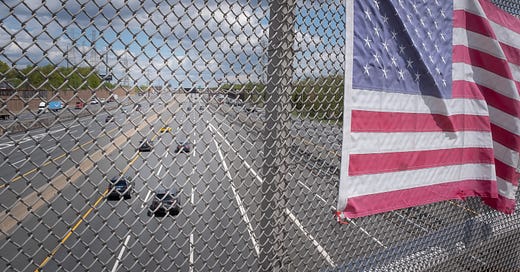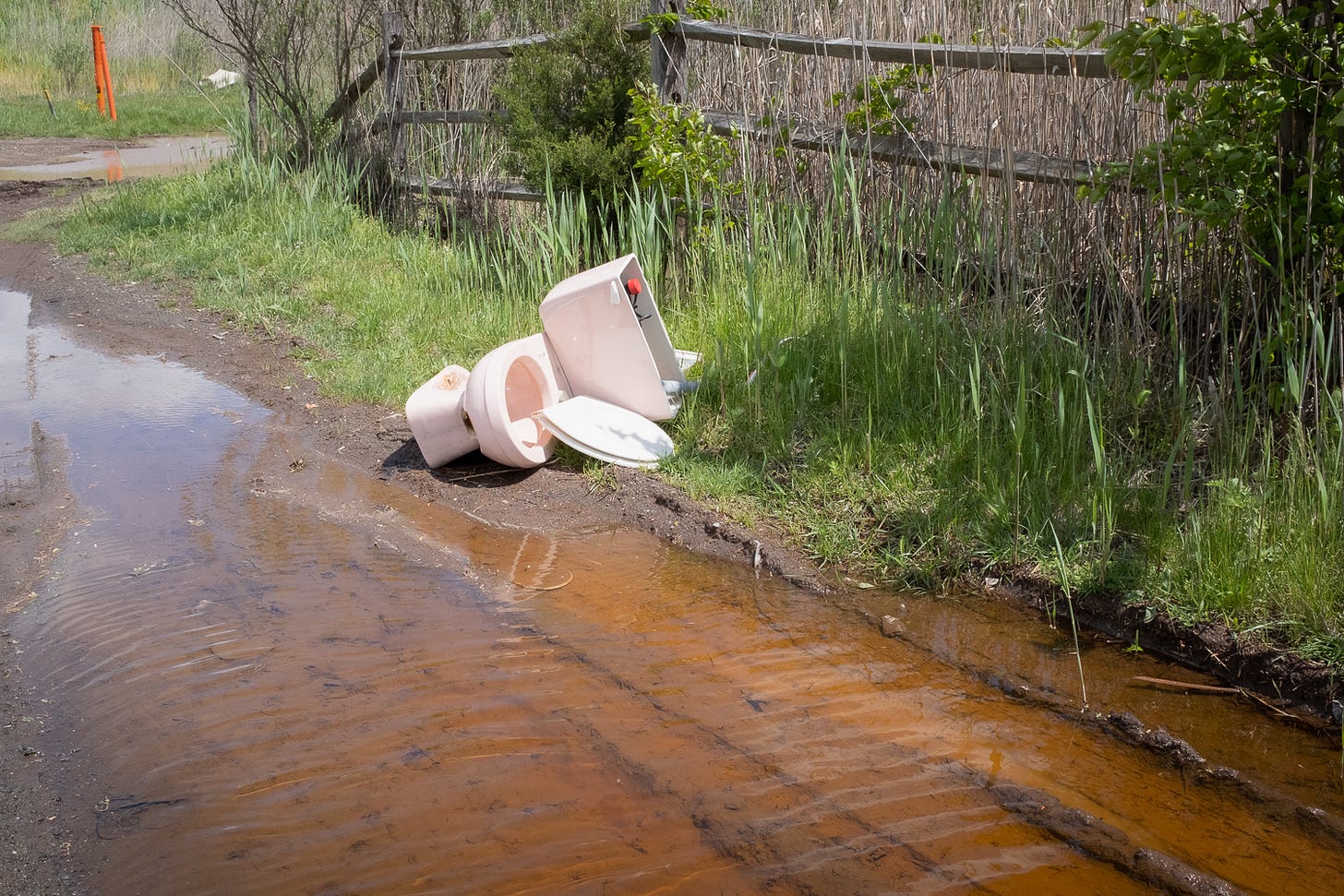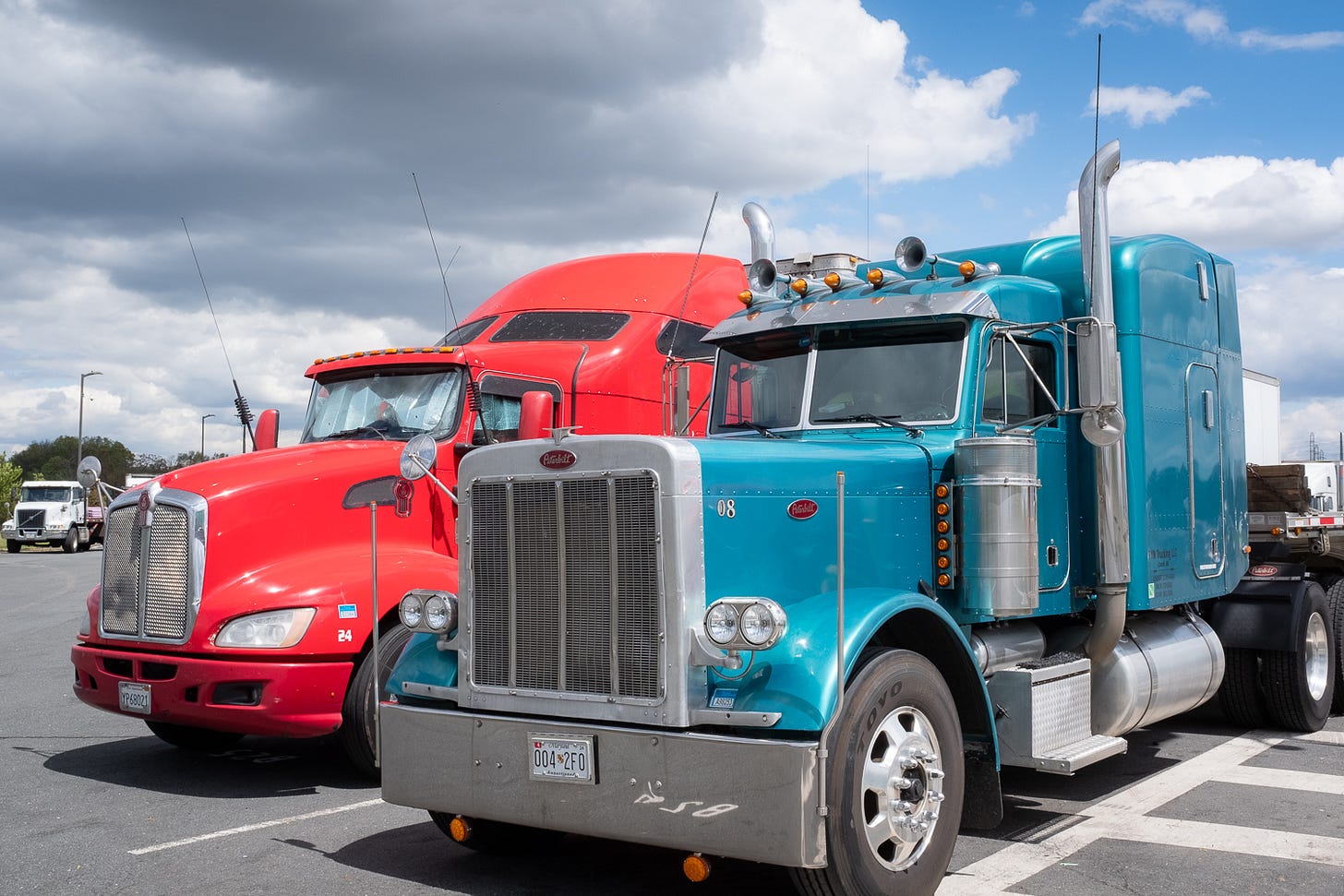It rained and rained in New York City. Relentless for three days, torrents in the gutters, but the hitchhiking gods looked on me kindly. By Monday it had stopped. Just in time.
Hitchhiking owes a lot to the US, possibly everything; its foundation, its romanticisation, its demise. There is nowhere in the world where the road is worshipped so much as America and nowhere is the car so revered. My own hitchhiking owes a lot to the US. It’s where I first did it. First got the bug.
To hitchhike out of New York you need to get to the Woodbridge Service Station and that requires a bus. Emerging from the dark bowels of New York’s Port Authority Bus Station late and a little stressed, I looked out down the vast dead-straight streets and couldn’t help but think of Whitehaven. The tiny town on a wet and grey Cumbrian coast was a long way from there and could hardly be more different, but it’s the town New York got its grid from (see Chapter 2). It was once the second biggest port in Britain, now it could probably fit in a single New York block. It’s funny how history moves.
As we got further away from Manhattan, the grid became a vast expanse of industry, replaced in its turn by the suburbs. Perfect lego-like cubes in perfect plots, evenly spaced, atomised. Like the car, the suburbs are the ultimate expression of American individuality. This time I couldn’t help but think of Letchworth (see Chapter 40).
I walked into the service station from the back. There was a strong wind that dragged ripples across the puddles. A toilet slumped abandoned in one of them. I wondered how it got there, wondered where it had come from and who’d once sat on it. Skirting through the car park, I felt like a bit of a pariah. Hitchhiking’s illegal in New Jersey so the anxiety was heightened.
Vast noses of trucks gleamed in the sun, enormous and aggressive and proud. It took me back to riding in one in California, sitting in the cab on the springy seats way above the road. A Mexican man with a trailer full of timber had taken me to a place called Eureka. He bought me a burrito and asked if I had a sister or an aunt he could marry.
Traffic trickled past. The wind whipped hair across my face and I had to fight to keep my cardboard sign upright. I had no idea what to expect, no idea if I’d get a ride. Any online blogs I’d seen had said it’s tricky hitching out of New York. Get a cheap bus from Chinatown they’d suggested.
It wasn’t tricky in the end. I only waited ten minutes. A car slowed to a stop and wound down the window. It was tiny between the looming trucks, like a dingy in a canyon. The driver wore a confused expression as if he was making an almost instinctive decision. He said he could take me as far as Philadelphia and pulled some clothes out of the footwell as I jumped in.
“I saw you there, saw your sign said ‘Brit’ and I thought, ‘What the hell’s a Brit doing standing in the middle of nowhere?’” Curiosity was what got him. Joras was a young man, younger than me. I told him I was going to D.C. to see some family and we accelerated up the slip road onto the interstate, sliding into the traffic.
“I gotta say though, I thought your sign said lovely Brit not lonely Brit!” He laughed. I explained it was a reference to the sign I had last time. Maybe I should have written it a bit clearer. Or perhaps ‘Lovely Brit’ was better.
Joras was coming back from a weekend in New York. He still had black and yellow nail varnish on and said he’d only woken up a couple of hours before. He’d been out partying with some friends and they’d met a guy in a bar who invited them to an underground house party. He told the story excitedly, as everyone tells stories of nights in New York. It’s that kind of place. It’s exciting. You meet people and they take you places.
Joras liked doing things like that. He was a nurse by day and would work several weeks on and then have several off. He’d get signed on short-term, well-paid contracts that could take him all around the country. He was going to Seattle in a few weeks and as a big coffee fan he was excited. It was where his coffee machine was from.
A year before a friend and I had set next to an Alaskan nurse on a train to Edinburgh. He did short-term nursing contracts too. He was a huge man with a bald head and a fierce beard. There was a big black Templar Cross on his neck. He’d just come back from the war in Ukraine having served a three-week, very lucrative contract out there. It had been intense. He was just behind the front line and had seen a few nasty things. He told us about them proudly and got out his phone and showed us a video of him and some Ukrainians walking through a wood. It was green and purple with tall silver trunks. Then there was an explosion and the camera flipped to a mitre of dirt. There was another and then another, some shouting and scuffling, then the explosions got further away and you could hear his panting.
Joras didn’t strike me as that kind of nurse. I told him it was nice to see nurses being paid properly though. In Britain they have a tough time of it. We all stood on our doorsteps every Thursday during covid to applaud their wonderful work, but apart from that they’ve received next to nothing since.
We were racing down the fast lane, deep in conversation, thrilled by the connection. Suddenly a truck swung rapidly through two lanes towards us, intent on overtaking the same lorry at the same time. It clearly hadn’t seen us. Joras pulled the wheel into his chest, crushing the break and slamming the horn. The truck kept surging onwards as we juddered over the lines towards the concrete wall in the central reservation. Joras fought for control of the car. He broke just in time and just enough. The truck whipped past our noses with a whoosh.
“Jesus, that was close!” He exclaimed, shaken. It was the closest to a crash I can remember coming. We wouldn’t have had much chance. The tiny Kia would have been swatted against the wall like an unlucky fly.
We sped up to overtake the truck once we’d regained composure and both shook rude hand signs at the driver. He didn’t see, he was too high up.
Joras told me about his family. His name was Greek although his parents were Mexican and Brazilian. They moved here before he was born.
“Do you go back much?”
“No. Never. I don’t get on with my family there,” he replied a little bitterly. He paused for a moment then explained why. “It’s because I’m darker than them and I’m gay.”
I said I was sorry to hear it but he didn’t mind too much. He had his two parents and five siblings which was plenty of family.
The fact he was a first gen immigrant meant he got to go to college for free. He’d been at Penn State and loved it. Originally he wanted to be a biochemist or doctor or something like that but in the end he realised he wasn’t cut out to work that hard. “I’d rather have fun,” he said casually, “You know, spend my weekends going to underground basements in New York!” He laughed. Nursing was a good compromise.
We were approaching Philadelphia passing through the town Joras grew up in, a place called Camden.
“If you look up Camden, New Jersey,” he explained, “you’ll find it’s the poorest place in the US.” We passed a dilapidated warehouse which illustrated the point but he said it had come up quite a bit recently. Much of it was to do with policing. Before, the police had come from outside towns and were mostly white. Twenty-odd years ago they reformed the force, recruiting cops from the community who understood the town and its inhabitants. Now crime was at a 50-year low. It was a hopeful case study.
It had been rough enough growing up there though. Luckily he’d never been the victim of anything himself but as a kid, he saw someone get shot dead in front of him. It was a sight that never left him.
“I was in town and some guy just got out of a car and shot the man in front of me. I was so shocked I couldn’t talk about it for a long time. It must have been drugs related. That’s why growing up I never smoked weed or anything. I didn’t want to get in with the wrong crowd.”
Joras had been sent to private schools outside of town. He’d got good grades and could leave town with a good job and he felt fortunate to have done so. Towns like that can grab your ankles and never let go. His parents still lived in Camden and he pointed up the street as we whizzed past it. They’d never had any trouble there.
We talked about gun laws and how mad they were. Joras had a gun himself. He’d bought it when he was twenty and it had been appalling how easily he’d bought it. “I just walked into a shop and walked out with something I could kill someone with! It was crazy. But I hope to god I never have to use it.” He told me that in New Jersey the law changed recently and was now much stricter on shooting intruders. He kept it anyway, locked up at the bottom of a safe.
American guns are fascinating for anyone not from there. Everyone who goes to America comes back with a story about them. It’s almost like some horrifying tourist attraction. But even just the sight of the black stump of a pistol grip in a policewoman’s belt fills you with some kind of rapturous fear. It sews violence into everything.
We climbed into the great metal frame of the Benjamin Franklin Bridge. Below, the silver water of the Delaware flickered, in front, the skyline of Philadelphia grew heavy. On the red brick wall of an old factory to the right, a huge mural of a Star Spangled Banner rippled in a drawn-on breeze.
“Wow, look at that,” I said.
“Oh yeah, because sometimes I forget what country I’m in…” Joras remarked dryly, “And sometimes I forget the first lines of the constitution We the people…so I need to be reminded of them all the time. And sometimes I forget the national anthem so it’s good to be reminded of that everyday too…”
We came off the bridge into Philadelphia. It was quiet and peaceful. A few pedestrians milled gently up the streets and the sun was bright through the clouds. The hitchhiking gods were still looking on me kindly. I was glad I hadn’t got a cheap bus from Chinatown.







